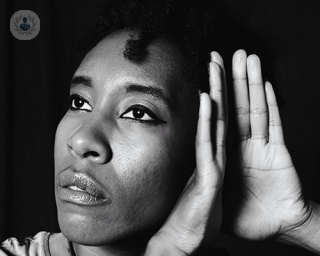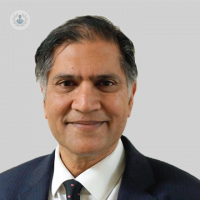What are cochlear implants?
Cochlear implants are small electronic devices that help people hear. They are usually an option for patients with inner-ear damage who do not benefit from hearing aids. A cochlear implant works by bypassing the damaged sections of the ear by transforming sound signals into electrical signals that stimulate the auditory nerve. A cochlear implant is not the same as a hearing aid, since it is implanted through surgery. This prosthesis replaces the function of damaged parts of the middle ear (cochlea).
There are many types of cochlear implants. However, the majority consists of two parts: an internal part that is placed in the skull through a surgical intervention and an external part that is located behind the ear.

Why are cochlear implants used?
Cochlear implants are created for people who have damaged the hair cells in the cochlea. Although they do not restore normal hearing ability, they can help deaf or hard-of-hearing people to better understand speech. As a result, cochlear implants can improve the quality of life for some patients. Both children and adults can benefit from cochlear implants. Results from a cochlear implant can consist of:
- Hearing speech without relying on visual cues, such as reading lips.
- Ability to listen in a noisy environment.
- Ability to hear the television and have telephone calls.
- Ability to locate where sounds have come from.
How are cochlear implants installed?
An incision behind the ear is made where a small dip is made for the internal device. A hole is made in the cochlea through which the electrode from the internal device is inserted.
Preparation for cochlear implants
A cochlear implant is not suitable for everyone. Requirement for being eligible for a cochlear implant include:
- The patient must be completely deaf or almost deaf in both ears and get little improvement with the hearing aids.
- Good motivation is key as having a cochlear implant is a process with rehabilitation and eventual integration into the hearing world.
- A good understanding of cochlear implants and realistic expectations of what they can and cannot do.
Before the procedure, you may need to stop certain medications and avoid food and drink. Surgery is performed under general anaesthesia.
Care after the cochlear implant is inserted
In some cases, patients must stay hospitalised overnight to remain under observation. It is normal after surgery to feel some dizziness, nausea and discomfort. Most return home the following day. The implant won’t be activated for a few weeks following surgery, and when it is, the patient will start working with the specialists to learn to "hear" and process sounds. The patient should follow a rehabilitation with the speech therapist after the placement of the cochlear implant.
11-13-2012 10-02-2023Cochlear Implants
Mr Peter Monksfield - Otolaryngology / ENT
Created on: 11-13-2012
Updated on: 10-02-2023
Edited by: Conor Dunworth
What are cochlear implants?
Cochlear implants are small electronic devices that help people hear. They are usually an option for patients with inner-ear damage who do not benefit from hearing aids. A cochlear implant works by bypassing the damaged sections of the ear by transforming sound signals into electrical signals that stimulate the auditory nerve. A cochlear implant is not the same as a hearing aid, since it is implanted through surgery. This prosthesis replaces the function of damaged parts of the middle ear (cochlea).
There are many types of cochlear implants. However, the majority consists of two parts: an internal part that is placed in the skull through a surgical intervention and an external part that is located behind the ear.

Why are cochlear implants used?
Cochlear implants are created for people who have damaged the hair cells in the cochlea. Although they do not restore normal hearing ability, they can help deaf or hard-of-hearing people to better understand speech. As a result, cochlear implants can improve the quality of life for some patients. Both children and adults can benefit from cochlear implants. Results from a cochlear implant can consist of:
- Hearing speech without relying on visual cues, such as reading lips.
- Ability to listen in a noisy environment.
- Ability to hear the television and have telephone calls.
- Ability to locate where sounds have come from.
How are cochlear implants installed?
An incision behind the ear is made where a small dip is made for the internal device. A hole is made in the cochlea through which the electrode from the internal device is inserted.
Preparation for cochlear implants
A cochlear implant is not suitable for everyone. Requirement for being eligible for a cochlear implant include:
- The patient must be completely deaf or almost deaf in both ears and get little improvement with the hearing aids.
- Good motivation is key as having a cochlear implant is a process with rehabilitation and eventual integration into the hearing world.
- A good understanding of cochlear implants and realistic expectations of what they can and cannot do.
Before the procedure, you may need to stop certain medications and avoid food and drink. Surgery is performed under general anaesthesia.
Care after the cochlear implant is inserted
In some cases, patients must stay hospitalised overnight to remain under observation. It is normal after surgery to feel some dizziness, nausea and discomfort. Most return home the following day. The implant won’t be activated for a few weeks following surgery, and when it is, the patient will start working with the specialists to learn to "hear" and process sounds. The patient should follow a rehabilitation with the speech therapist after the placement of the cochlear implant.


Cochlear implants: is hearing fully restored?
By Professor Simon Lloyd
2025-02-05
Cochlear implants enable someone with profound hearing loss to be able to communicate and lead a normal lifestyle. We asked top ENT surgeon Professor Simon Lloyd to explain just how well the implants work and if hearing is fully restored. See more


Cochlear implants: life-transforming technology for hearing loss patients
By Professor Manohar Bance
2025-02-04
Cochlear implants can transform the lives of many people, restoring hearing loss in adults and children who have severe to profound inner hearing loss. In this article, Professor Manohar Bance, one of the UK’s leading otologists, gives us an overview of cochlear implants. See more


Cochlear implants: how do they work?
By Professor Simon Lloyd
2025-02-02
Cochlear implants are a small device that provides a sense of sound to a person who is profoundly deaf, which means that both deaf adults and children can lead a normal life. Expert otolaryngologist and ENT surgeon Professor Simon Lloyd explains how the device works exactly and what are the benefits vs. the disadvantages. See more


What is the minimum age for receiving cochlear implants?
By Mr Nish Mehta
2025-01-31
To people who are deaf or have severe hearing loss, cochlear implants are a way to perceive the sensation of sound of the world around them. Leading consultant ENT surgeon, Mr Nish Mehta, explains how cochlear implants are fixed in the ear and if there is a minimum age for receiving them. See more
Experts in Cochlear Implants
-
Professor Shakeel Saeed
Otolaryngology / ENTExpert in:
- Cochlear Implants
- Endoscopic skull base surgery
- Hearing loss
- Tinnitus
- Cholesteatoma
- Otosclerosis
-
Professor Simon Lloyd
Otolaryngology / ENTExpert in:
- Otology
- Perforation of the eardrum
- Cochlear Implants
- Acoustic neuroma
- Dizziness
- Tinnitus
-
Professor Manohar Bance
Otolaryngology / ENTExpert in:
- Cochlear Implants
- Hearing loss
- Vertigo
- Ménière's disease
- Middle ear surgery
- Otitis
-
Mr Harry Powell
Otolaryngology / ENTExpert in:
- Cholesteatoma
- Cochlear Implants
- Ear infection
- Tonsillectomy
- Hearing loss
- Otosclerosis
-
Mr Nish Mehta
Otolaryngology / ENTExpert in:
- Otology
- Cochlear Implants
- Hearing loss
- Cholesteatoma
- Ear infection
- Paediatric ENT
- See all

The Lister Hospital - part of HCA Healthcare
The Lister Hospital - part of HCA Healthcare
Chelsea Bridge Road, London
No existe teléfono en el centro.
By using the telephone number provided by TOP DOCTORS, you automatically agree to let us use your phone number for statistical and commercial purposes. For further information, read our Privacy Policy
Top Doctors

OneWelbeck Ear Nose & Throat
OneWelbeck Ear Nose & Throat
1 Welbeck St, London, W1G 0AR
No existe teléfono en el centro.
By using the telephone number provided by TOP DOCTORS, you automatically agree to let us use your phone number for statistical and commercial purposes. For further information, read our Privacy Policy
Top Doctors

The Wilmslow Hospital - part of HCA Healthcare
The Wilmslow Hospital - part of HCA Healthcare
52-54 Alderley Road, Wilmslow, Cheshire, SK9 1NY
No existe teléfono en el centro.
By using the telephone number provided by TOP DOCTORS, you automatically agree to let us use your phone number for statistical and commercial purposes. For further information, read our Privacy Policy
Top Doctors
-
The Lister Hospital - part of HCA Healthcare
Chelsea Bridge Road, London , Central LondonExpert in:
- Cancer
- Cardiology
- Orthopaedic surgery
- Pregnancy
- Physiotherapy
- Women’s health
-
OneWelbeck Ear Nose & Throat
1 Welbeck St, London, W1G 0AR, W1G Marylebone LondonExpert in:
- Voice disorders
- Sleep apnoea
- Audiology
- Blocked nose
- endoscopy
- Otolaryngology
-
The Wilmslow Hospital - part of HCA Healthcare
52-54 Alderley Road, Wilmslow, Cheshire, SK9 1NY, WilmslowExpert in:
- Breast Cancer
- Men's health check
- Orthopaedic surgery
- Obstetrics and Gynaecology
- Women’s health
- Sports Medicine
- Most viewed diseases, medical tests, and treatments
- HHT (Hereditary Haemorrhagic Telangiectasia)
- Snoring
- Polysomnography (sleep study)
- Nystagmus
- Migraine
- Minimal access surgery (keyhole surgery)
- Head and neck cancer
- Neck lump
- Botulinum toxin (Botox™)
- Thyroid disorders








